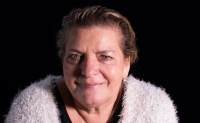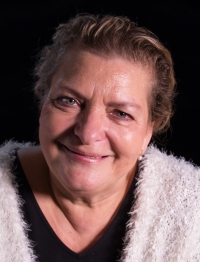In the end, the Communists would drive us away from Czechoslovakia

Download image
Ida Kelarová, née Bittová, was born on February 10th of 1956 in Bruntál to a family of ‘mixed nationality’. Her mother, Ludmila, came from a Moravia-Slovakian family and grew up in Uherský Brod, while her father, Koloman, came from a Romani family who had been living in Southern Slovakia. She has two younger sisters, Ïva and Regina. Her mother was a teacher, her father a renown musician. Due to her father´s career, the family had to move several times. Ida grew up in Vrbno pod Pradědem, in Prešov and in Opava, where she attended People´s School of Arts. Afterwards, she studied piano and violoncello at Janáček Academy of Music and Performing Arts in Brno. She often visited his family in Horní Saliby where she felt most free. She married Vlastimil Kelar, a French horn player, as an eighteen-year-old, giving birth to her son, Tomáš, but got divorced after two years. From 1975 to 1982, she had a residency at Theatre on a String (Divadlo na provázku) in Brno. In 1982, she went to an international festival in Denmark with the theatre, meeting her second husband, a citizen of Great Britain, who would move with her to Czechoslovakia. After that, Ida and her husband had been persecuted by the Secret Police as the authorities suspected her husband of espionage. Ida lost her job at the theatre and had been forced to leave the country. In the end, exhausted by a series of interrogations, they both willingly left Czechoslovakia for Wales, her husband´s birthplace. Ida spent some time as a housewife, but after giving birth to a daughter she learned that her father died and found herself in a situation both painful and life-changing. She gave her first solo concert playing Romani songs and moved with her husband to Denmark offering singing workshops. After being invited to Norway, she would travel the country and sing with the distant communities of the polar region. While doing that, she found out about the November 1989 revolution in Czechoslovakia. After she returned to the Czech Republic in 1995, she founded International Performance Initiative (Mezinárodní škola pro lidský hlas), she had been organising international workshops, started projects promoting multi-ethnic coexistence, and also founded the Gypsy Celebration Hartmanice festival and several ensembles performing Romani songs. In 1999, she founded the Romano Rat (Romani blood) band with Desider Dužda, her present partner, and has been playing worldwide since. In 2001, she had been nominated for the Czech Lion Award (Český Lev) as an author of the musical score for The Pilgrimage of Students Peter and Jacob (Zpráva o putování studentů Petra a Jakuba). She has been the first person in her family who openly spoke about her Romani heritage.

